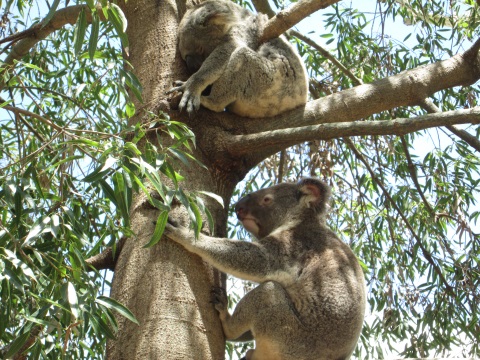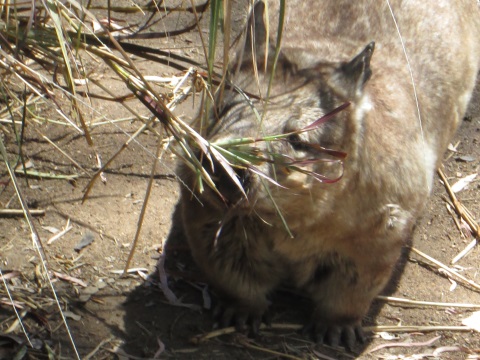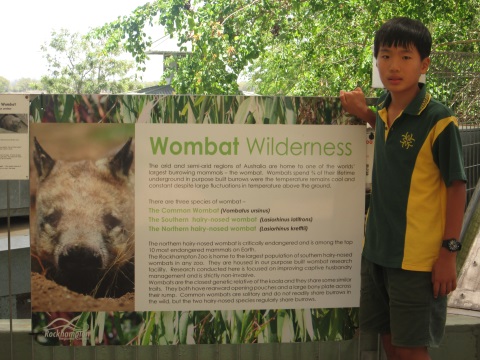The Glenmore Intensive English Class enrols students from schools around the Rockhampton region who are in their first year of schooling in Australia and have little English. Students attend the class two days a week and attend their base school for the other three days.
Term 1
In Term 1 we focused on personal, school and family vocabulary. As part of learning about the ‘reptile family’ we visited the Koorana Crocodile Farm. It was a fun day. We were allowed to hold the young crocodile!
Term 2
In Term 2, we learned about food, shops and our  senses. We went on an excursion to IGA Glenmore to practise our vocabulary and speaking. We had to ask the staff for items so we could make recipes the following day. Then we did a treasure hunt to find items using the names of items in each aisle.
senses. We went on an excursion to IGA Glenmore to practise our vocabulary and speaking. We had to ask the staff for items so we could make recipes the following day. Then we did a treasure hunt to find items using the names of items in each aisle.
The items we bought were used to make mini pizzas, fruit salad and fruit smoothies.
To learn how our senses work, we used a blind fold to do taste testing, smelling, listening and touching. It was fun. Some things tasted, smelled and felt disgusting. Other things were yummy.



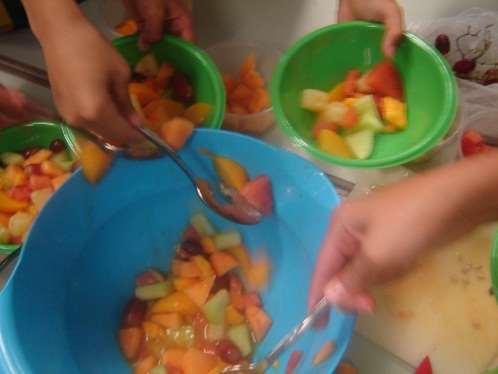

Term 3
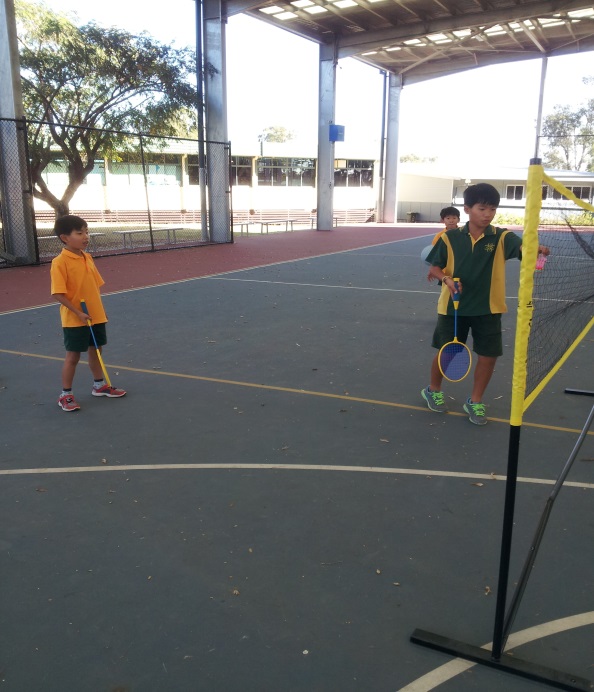
This term EAL/D students learnt about sport and leisure because it will help us in our future.
Sports are very good because when you do sports your body is very healthy. Swimming, soccer and tennis are sports that make you move very fast. This is why we enjoy sports. In class we played tennis, badminton, 3 legged-race, bocce and running races.
Leisure includes doing activities you enjoy, like hobbies. Everyone is a little different with the hobbies they like. My leisure activity is riding a bike. Other people in my class like exercising, playing video games, playing cards, painting pictures, reading books and talking to friends.
By Sunwoo
This term we were learning about animal classification because we know learning will help us in our future. Animals are divided in two classifications, vertebrates and invertebrates. Vertebrate means the animal has a backbone and invertebrate means they don’t have a backbone. Vertebrates are divided into five main groups; mammals, birds, fish, reptiles and amphibians.
- Mammals have live babies, are warm-blooded and drink milk from their mother. Some examples are cows, pigs and kangaroos (marsupial).
- Birds lay eggs, have feathers and are warm-blooded. Some examples are hummingbirds, magpies and crows.
- Fish lay eggs, have moist scales and are cold-blooded; for example, goldfish, shark and barramundi.
- Reptiles lay eggs, have dry scales and are cold-blooded. Some examples are crocodiles, lizards and turtles.
- Amphibians lay eggs, have moist skin, are cold-blooded and live in and out of the water. Some examples are frogs and salamanders.
We also investigated invertebrates which have no backbone. There are 7 main types of invertebrates.
- Insects: exoskeleton, 3 body parts and 6 legs, like, bees and ladybirds.
- Arachnids: 2 body parts and 8 legs, like, spider, ticks and mites
- Crustaceans: exoskeleton, like, crabs and lobsters.
- Protozoa: small single-cell animals.
- Annelids: segmented bodies and no limbs, like, worms and leeches.
- Molluscs: soft skin with hard outside shell. Some live on land like snails and slugs. Others live in water like, oyster, mussel, clam, squid and octopus. Some may have a sole foot.
- Echinoderms: Some have arms or spines coming from the centre of their body. Star fish, sea urchins and sea cucumbers are a few.
By Jungwoo
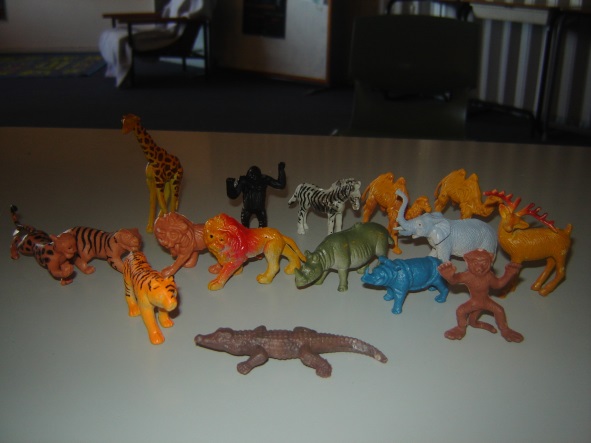
Some of the EAL/D students from the IEC performed at the Glenmore Fete. They were a little nervous, but very excited, to share their talents.
Lily played a Chinese instrument called a “cucurbit flute”. The song she played was a traditional Chinese song about the moon.
Our three Korean brothers who attend Waraburra and Glenmore, played the piano.
Chanwoo, in Year 4, played ‘Fuer Elise’ by Ludwig van Beethoven. Jungwoo, in Year 6, played ‘Variation on Canon’ by George Winston and Sunwoo, in Year 6, played ‘Auf Flugeln des Gesanges’ by Jakob Ludwig Felix.
Term 4
In Term 4, it was Mrs Freitag’s birthday. The IEC put their skills of following procedures into action and created their own version of a trifle to celebrate.
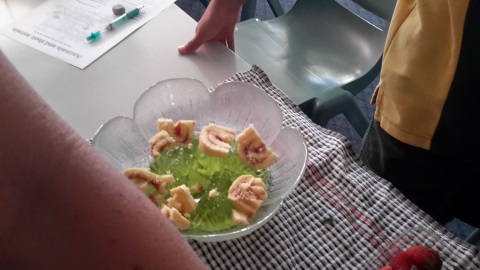
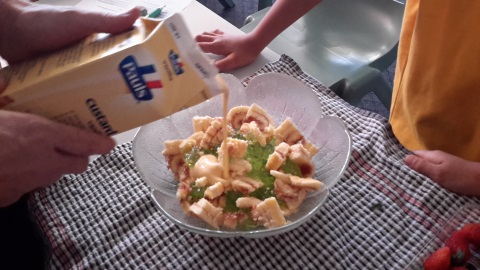
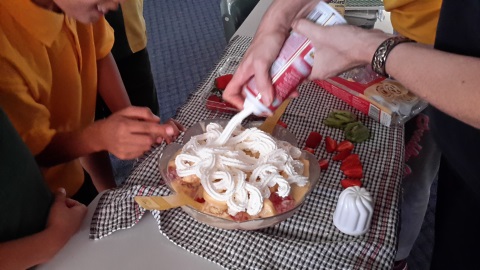
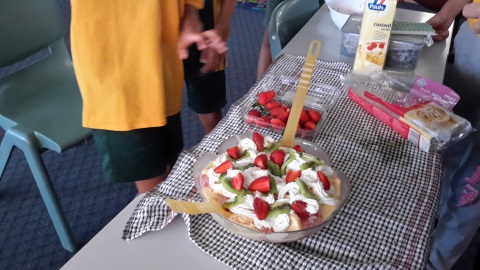
This term, the Intensive English Class has been learning about animals. We learnt about their classifications, lives and habitats. Then we focused on Australian animals and went to the Botanic Gardens Zoo for an excursion. Now we are putting together fact files on the animals we learnt about and creating a movie clip around the animals that we saw. ABC radio host Jacquie MacKay even came and interviewed us. You can listen to the recording of this on the website for the ABC radio morning show dated: 18th November 2014.


